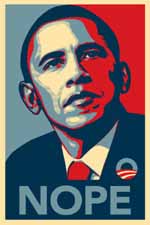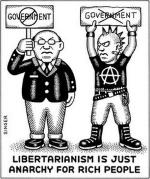
On 4 July of this year, I wrote one of my typical “holiday destroying” stories, American Independence Was Limited. The article was about how the Declaration of Independence wasn’t an important document at the time and how it didn’t apply to most of the people in America.
It didn’t apply to blacks. It didn’t apply to women. And most of all, it didn’t apply to the native peoples who we were forcing west and would soon have an entire official genocide waged against. That was a genocide that was very much supported by the author of the Declaration, Thomas Jefferson.
But you don’t have guess. I was reminded today by Noam Chomsky via Digby that the Declaration of Independence includes very explicit language about this. We have fully accepted all that stuff about slavery and three-fifths of a human being as a mistake in the Constitution. (How people can say it was divinely inspired I’m not sure. Of course the Bible has the same problem.) Anyway, the Declaration has easily as offensive language about Native Americans as the Constitution has about African Americans.
The Declaration on Native Peoples
The Declaration of Independence is structured in three parts: the introduction, the complaints, and the conclusion. The complaints (or “indictments” if you prefer) take the form of 13 “He has…”; 9 “For…”; and another 5 “He has…” And it is the last “He has…” that concerns us. Because it is a doozy:
He has excited domestic insurrections amongst us, and has endeavored to bring on the inhabitants of our frontiers, the merciless Indian Savages whose known rule of warfare, is an undistinguished destruction of all ages, sexes and conditions.
Pretty awesome, huh? Do you feel proud? Do you remember in the show stopping number in the musical 1776, “Merciless Indian Savages Killed My Daughter”? No?! It must be because not only is the number not in the film, the whole issue is avoided because any reasonable person (such as screenwriter Peter Stone) is horrified and ashamed of this passage.
Racism in Context
Consider this. You live in a place where your ancestors have lived since before anyone can remember. And one day, a bunch of people with better weapons than you come in and force you out of your ancestral land. You object, but you lose the fight. So you move on, but soon enough, more of the same people come and push you out. You object, but you lose the fight.
And then these same people claim that you are the merciless savage! This is what we in cliche business call, literally adding insult to injury.

Conservative Apologias
But just because many people now look back on this with horror and shame does not mean that everyone does. The typical conservative response to this is apologia, of course.
For example, the Claremont Institute simply claims, “The British had encouraged slave and Indian revolts against the colonists.” There is no discussion of the term “merciless Indian Savages.” There is no discussion of the claim that the native population broke the western rules of war by killing women, children, and the infirm.
And then it goes on to talk about something entirely unrelated: the fact that Jefferson’s original draft then went on to talk about how terrible slavery was. In other words, “He wasn’t such a bad guy after all!” (Also, slavery was only sporadically and theoretically terrible for Jefferson.)
More of the Same
I’ve read other conservative discussions of this part of the Declaration and they are all pretty much the same. I did run into one that I won’t bother to find again that argued that the text is actually a compliment to the native population because they were practicing the kind of war that would make war less common.
This is interesting, because I was just discussing in the comments how this same logic was used to justify World War I. But regardless, there is no reason to think that this is what Jefferson meant. And I think the “merciless Indian Savages” kind of gives away the game.
Modern Native American Responses
The only place online that I’ve found any serious discussion of this passage is on Native American blogs and news sources. Even the Wikipedia page on the Declaration doesn’t deal with the issue.
About the best I’ve found is Adrian Jawort at Indian Country Today, The Declaration of Independence—Except for “Indian Savages.” She makes an excellent point: the part about slavery was thoroughly discussed and jettisoned. That means that everyone in the congress was fine with the passage about the “merciless Indian Savages.”
But Jawort goes on to give some historical context about how the native peoples tried to get along with the colonists:
The Stockbridge Natives of Massachusetts and other New England tribes like the Oneida spoke the same language of rights and freedom as the colonialists on the onset of the war and bled the same red blood for the cause. Stockbridge Sachem (Chief) Solomon Unhaunawwaunnett said, “If we are conquered our Lands go with yours, but if we are victorious we hope you will offer us our just Rights.”
All eastern tribes were leery of being caught in the middle of another white man’s war after the horrific atrocities committed during the French and Indian War (1754-1763) that had concluded just a dozen years prior to the onset of Revolutionary War. But they knew this war would affect them again nonetheless, and placed loyalties based on which side they thought would be fairest and able to garner them the most lands lost back.
In spite of most New England area tribes’ sincerest efforts to aid Americans, “Indian patriotism did not earn Indian people a place in the nation they helped create,” writes British American and Dartmouth Professor Colin G Calloway in his book, The American Revolution in Indian Country: Crisis and Diversity in Native American Communities. “For Native Americans, it seemed the American Revolution was truly a no-win situation.”
He continued, “…The Stockbridge and their Oneida friends who had adopted the patriot cause found that republican blessings were reserved for white Americans.”
Before and after the war most Stockbridge Natives sincerely tried to adopt the white man’s ways—including adopting Christianity. They were allowed to be assemblymen in their namesake Stockbridge town, but as soon as the war concluded the representative Stockbridge Native “selectmen” numbers declined rapidly until whites took over all aspects of the land and government. Most of the Stockbridge Natives were finally forced out to Wisconsin—along with many Oneida—in 1822.
Thereafter in 1824 all Natives were to be considered wards of the state under the US’s newly formed BIA [Bureau of Indian Affairs] operating under the Department of War. And war would continue to be as even peaceful tribes like the Cherokee who also adopted the white ways would be forcibly removed from their homelands, while others were simply eradicated under the cloud of the US’s Manifest Destiny mindstate.
The Oneida Indian Nation in New York was the first proclaimed ally of the US, fighting in various pivotal battles while selflessly providing corn to George Washington’s starving troops at Valley Forge. Current Oneida Nation Representative Ray Halbritter (whose tribe also owns www.ictmn.com) has actively been involved in the fight for garnering respect for his and other tribes via getting rid of the Washington Redskins mascot that’s deemed a racial epithet.
Our Vague Wrongdoing
This country’s treatment of the native peoples is arguably our greatest shame. Its inclusion in one of our two most important founding documents in such explicitly offensive language shows that it runs to the very heart of our nation. And I think we still haven’t dealt with it.
As bad as the history of slavery, segregation, lynchings, and so much more, at least we as a country talk about what we’ve done to our African American citizens. But when it comes to Native Americans, I think even very liberal people have only vague notions of what we have done.
And we don’t talk about it, as though ignoring it will make the legacy of racism and genocide go away.
Afterword
In 2000, the Bureau of Indian Affairs did publish a formal apology. Here is part of it:
We must first reconcile ourselves to the fact that the works of this agency have at various times profoundly harmed the communities it was meant to serve. From the very beginning, the Office of Indian Affairs was an instrument by which the United States enforced its ambition against the Indian nations and Indian people who stood in its path. And so, the first mission of this institution was to execute the removal of the southeastern tribal nations. By threat, deceit, and force, these great tribal nations were made to march 1,000 miles to the west, leaving thousands of their old, their young and their infirm in hasty graves along the Trail of Tears.
As the nation looked to the West for more land, this agency participated in the ethnic cleansing that befell the western tribes. War necessarily begets tragedy; the war for the West was no exception. Yet in these more enlightened times, it must be acknowledged that the deliberate spread of disease, the decimation of the mighty bison herds, the use of the poison alcohol to destroy mind and body, and the cowardly killing of women and children made for tragedy on a scale so ghastly that it cannot be dismissed as merely the inevitable consequence of the clash of competing ways of life. This agency and the good people in it failed in the mission to prevent the devastation. And so great nations of patriot warriors fell. We will never push aside the memory of unnecessary and violent death at places such as Sand Creek, the banks of the Washita River, and Wounded Knee.
Nor did the consequences of war have to include the futile and destructive efforts to annihilate Indian cultures. After the devastation of tribal economies and the deliberate creation of tribal dependence on the services provided by this agency, this agency set out to destroy all things Indian.
This agency forbade the speaking of Indian languages, prohibited the conduct of traditional religious activities, outlawed traditional government, and made Indian people ashamed of who they were. Worst of all, the Bureau of Indian Affairs committed these acts against the children entrusted to its boarding schools, brutalizing them emotionally, psychologically, physically, and spiritually. Even in this era of self-determination, when the Bureau of Indian Affairs is at long last serving as an advocate for Indian people in an atmosphere of mutual respect, the legacy of these misdeeds haunts us. The trauma of shame, fear and anger has passed from one generation to the next, and manifests itself in the rampant alcoholism, drug abuse, and domestic violence that plague Indian country. Many of our people live lives of unrelenting tragedy as Indian families suffer the ruin of lives by alcoholism, suicides made of shame and despair, and violent death at the hands of one another. So many of the maladies suffered today in Indian country result from the failures of this agency. Poverty, ignorance, and disease have been the product of this agency’s work.
As a country, we are very bad at admitting our mistakes. So I’m glad about this. But for a country that still can’t admit to its recent torture program, it doesn’t make me all that hopeful.
Thanks to The Bones of Muddy Banks for correction.

 Do you remember that kid when you were young who would always rat out your childhood nefarious schemes to the teacher or parents? That was Barack Obama. I don’t mean when he was that old. I kind of think when he was six that he was a little devil. And I understand that he went through his radical period in college, because he’s written about it. But now. He’s the kid who is so dependent on the approval of authority that he is no fun.
Do you remember that kid when you were young who would always rat out your childhood nefarious schemes to the teacher or parents? That was Barack Obama. I don’t mean when he was that old. I kind of think when he was six that he was a little devil. And I understand that he went through his radical period in college, because he’s written about it. But now. He’s the kid who is so dependent on the approval of authority that he is no fun. If you read Paul Krugman’s blog, you can pretty well guess what his columns will be about. He even says that he uses his blog to work out his thinking. And for the last week, he has been going on a bit about the
If you read Paul Krugman’s blog, you can pretty well guess what his columns will be about. He even says that he uses his blog to work out his thinking. And for the last week, he has been going on a bit about the  I have a question for conservatives. I don’t mean the social conservatives, because I think they actually get pretty good value from the Republican Party. I mean the ones who think of themselves as leaning libertarian. These are the ones who think of themselves as caring about concepts like “freedom.” My question is simple: why do you continue to vote Republican when the party doesn’t actually increase your freedom?
I have a question for conservatives. I don’t mean the social conservatives, because I think they actually get pretty good value from the Republican Party. I mean the ones who think of themselves as leaning libertarian. These are the ones who think of themselves as caring about concepts like “freedom.” My question is simple: why do you continue to vote Republican when the party doesn’t actually increase your freedom? On this day in 1792, the great Romantic poet
On this day in 1792, the great Romantic poet